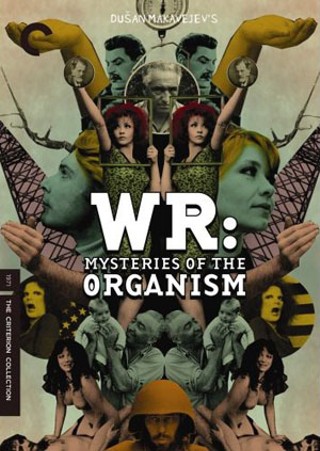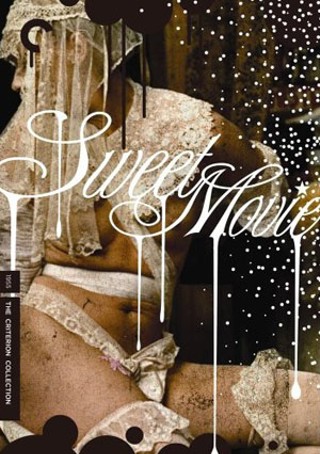WR: Mysteries of the Organism and Sweet Movie
Reviewed by Spencer Parsons, Fri., July 13, 2007

WR: Mysteries of the Organism
Criterion, $39.95
Sweet Movie
Criterion, $29.95
"Hey Potemkin, aren't you from that famous revolution that failed?" chirps Sweet Movie's Anna Planeta to the ardent young sailor who has just boarded her floating candy shop. It trolls the canals of Amsterdam with a bust of Karl Marx on its prow, the better to lure horny idealists and unwary children; the goldfish swimming in the tear suspended from Marx's eye, the corpses alleged to lie within its hold, and the playfully predatory sexuality graphically indulged onboard this good ship lollipop disorient the too-obvious allegory with whimsy, violence, and eroticism in a storm of contradiction. For director Duan Makavejev, the failure of revolution is no reason not to cling to revolutionary ideals. Yet ideals cannot obscure inevitable horror, and none of it should stop you from laughing.
A specter of failure hangs over the aesthetic, political, and sexual revolutions of Sweet Movie and WR: Mysteries of the Organism and lurks about in Criterion's fine packages of extras for good measure. WR takes off from a documentary about psychoanalyst Wilhelm Reich, whose fusion of Marx and Freud in a theory of social liberation through the energies released by orgasm got him in trouble with the Nazis, the Communist Party, and finally, our very own Food and Drug Administration, which destroyed his writings and threw the Austrian exile in jail, where he died. Elsewhere, in the film's chief fictional thread, a young Yugoslavian woman advocates sexual uprising to her comrades, and her attempt to practice what she preaches results in beheading by ice skate at the hands of a repressed Soviet athlete who she has fondly dubbed "a real Red fascist." Nevertheless, her severed head speaks of refusing to renounce her beliefs.

These films succeeded in getting Makavejev exiled from his native Yugoslavia and banned from numerous other countries, and while their unique and unstable collisions of documentary and fiction attracted much attention in the West, funding for other projects like these would run aground on the need for a traditional screenplay … except movies like these can't be made with screenplays. In "Hole in the Soul," a 1994 essay film for the BBC included on the WR disc, Makavejev consults a peculiarly demanding "connoisseur" named Dennis Jakob on the state of his career, only to be told that what he did in the Sixties and Seventies won't work anymore, that his films have become nonthreatening, and that he has no future. However unwelcome, much of what Jakob says has an unpleasant ring of truth, even as the cinephiliac hobgoblin's assertion that Makavejev just isn't funny anymore gets roundly refuted by his own inclusion in the film.
Split between mid-Nineties Hollywood and postcommunist, post-Yugoslavian Serbia, this 53-minute-long documentary surveys the emotional landscape of a then-radical, now-bourgeois filmmaker finally allowed to come and go after years of exile, only to doubt the past as much as the future. Still, the unruly energies of WR and Sweet Movie haven't been so tamed by history or the ascendance of Jackass and eBaum's World as one might expect. The uncouth collision of ideas and sentiments here remains at least as transgressive as the child-seduction scene from Sweet Movie that could still land video-store proprietors in court, so have these revolutionary films about failure really failed themselves? Their obscenities add up to something distressingly intangible and yet palpably greater than contributing to the everlasting glory of MTV or Internet notoriety.










